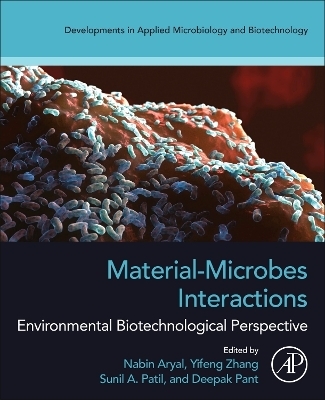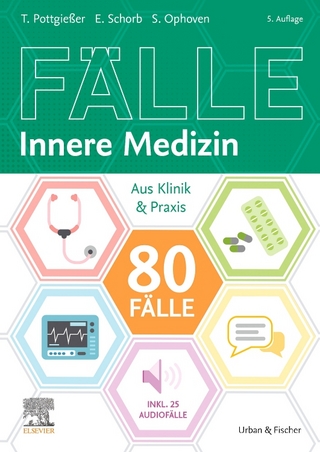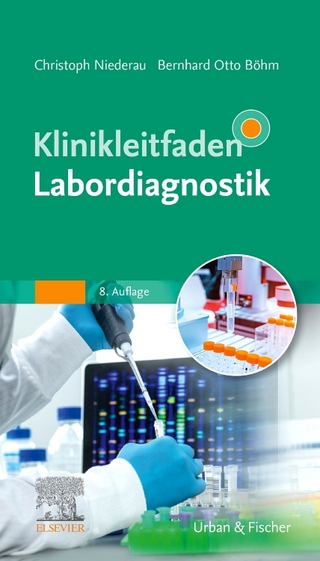
Material-Microbes Interactions
Academic Press Inc (Verlag)
978-0-323-95124-1 (ISBN)
Interestingly, academic institutions, wastewater treatment plants and research centers have upscaled biofilm-based environmental technologies, such as moving bed bioreactors, microalgae, tricking bed reactors, biofilters, and bioelectrochemical process as promising environmental technologies.
Nabin Aryal is an Associate Professor at the University of South-Eastern Norway (USN), Norway. He received MSc in Environmental Technology and Engineering from Ghent University, Belgium, with an Erasmus Mundus fellowship from European Union and then a PhD. from the Technical University of Denmark (DTU) in Environmental Biotechnology with financial support from Novo Nordisk Foundation, Denmark. Before joining USN, Dr Aryal engaged in joint industrial postdoctoral research at Aarhus University and the Danish Gas Technology Center, Denmark. He has more than a decade of work experience from Norway, Denmark, Belgium, the Czech Republic, India, and Nepal. His current research focuses on microbe-material interaction, biofilm-based bioprocess development, anaerobic technology, biogas upgrading, and carbon dioxide utilization. He has co-authored over 40 scientific publications and edited one book on biogas upgrading that received h-index 15 (>1100 citations; Google Scholar). Yifeng Zhang is currently working as an associate professor at the Department of Environmental Engineering, Technical University of Denmark (DTU). He obtained his Ph.D. degree from DTU in 2012. He is also serving as editor/associate editor in several prestigious journals in the field including Water Research, Science of the Total Environment, Frontiers in Microbiology, Sustainable Horizons, Water Cycles etc. His major research interests are microbial electrochemistry and biotechnology to support the 2nd, 6th, 7th, 12th, and 13th UN Sustainable Development Goals through sustainable water treatment, resource recovery, CO2 capture and utilization, biosynthesis, and environmental bioremediation & monitoring. He is recognized as an international young leader in both (i) microbial electrochemistry as well as (ii) bioenergy recovery from wastes. His accomplishments so far have been well documented in 136 SCI publications in top journals in the field, 2 patents, 3 book chapters, and numerous conference contributions. According to Google Scholar, his works have been cited over 5300 times and with an H index of 40. He has been listed as World's Top 2% Scientists 2020 and 2021. In the same year, he was selected as top 50 among global competitions for The Elsevier Foundation-ISC3 Green & Sustainable Chemistry Challenge Award. In 2022, he received Honorable Mentions for the James J. Morgan Early Career Award given by the American Chemical Society. Since receiving his PhD, he has been successfully attracting over 35 M DKK funding from e.g., Horizon Europe, The Carlsberg Foundation, Independent Research Fund Denmark, the Villum Foundation, and the Novo Nordisk Foundation. In 2018, he received a Carlsberg Foundation Distinguished Fellowship which is given to talented young scientists to establish their research group. Dr. Sunil A. Patil is currently working as an Assistant Professor of Environmental Microbiology and Biotechnology at the Indian Institute of Science Education Research Mohali (IISER Mohali). He obtained Ph.D. in Microbiology from S. P. Pune University in 2011. Before joining IISER Mohali, Dr. Sunil worked as a postdoctoral fellow at Technical University Braunschweig, Germany, Lund University, Sweden, and Ghent University, Belgium. His current research focuses on two major themes: (i) Understanding extracellular electron transfer-based anaerobic metabolisms and microorganisms from extreme environments, and (ii) Developing integrated microbial electrochemical technologies for renewable electricity-driven bioproduction of chemicals from industrial CO2 and wastewater management at the point sources. His research accomplishments include over 60 SCI publications in top journals in the field, 3 patents, 14 book chapters, and >80 conference contributions. According to Google Scholar, his works have been cited over 4600 times, with an H index of 33. Dr. Sunil has been on the editorial board of Bioresource Technology Reports since its launch in 2017. He is also the associate editor for the Microbiotechnology specialty section of Frontiers in Microbiology, Frontiers in Bioengineering and Biotechnology, and Frontiers in Environmental Science journals. He has been on the board of directors of the International Society of Microbial Electrochemistry and Technology (ISMET) since 2020. Dr. Sunil is a recipient of the DAAD doctoral scholarship (2008-2010), Marie Sklodowska-Curie postdoctoral fellowship (2011-2015), and Alexander von Humboldt fellowship for senior researchers (2016-2017). He was conferred the best teacher award 2021 by IISER Mohali and the CDC India-Professor Ashok Pandey Research Excellence award 2021 by the Biotech Research Society of India (BRSI) in recognition of his contributions in the area of Environmental Biotechnology. Deepak Pant is a Senior Scientist at the Flemish Institute for Technological Research (VITO), Belgium, leading the research linked to electrochemical and bioelectrochemical conversion systems with a focus on CO2 conversion in recent years. He has co-authored 194 publications in peer-reviewed journals (13 of which are “highly cited on Web of Science), 40 book chapters, 6 patents and has edited 6 books on topics as Microbial electrochemistry, LCA, Bioeconomy and Applied Biotechnology. Current h-index is 75 (>16800 citations; Google Scholar). He was recently awarded the Highly Cited Researcher 2022 from Clarivate for multiple highly cited papers in last decade. He is a member of several scientific communities including ISMET, ISE, BES, BRSI, IFIBiop and AMI and was made a fellow of the Biotechnology Research Society of India (BRSI) in 2018 and Royal Society of Chemistry (RSC) in 2021.He is a member of the editorial board of 10 journals, Editor for ‘Bioresource Technology Reports’ (Elsevier) and acts as a peer reviewer for numerous journals. He has participated/participates in >25 projects of which 14 are European projects (FP7/H2020/Horizon Europe) on CO2 conversion, electrode development and resource recovery. He has a wide international network of active collaboration, among them from several European ongoing projects as coordinator, work package leader or partner (E2C, PERFORM, Bac-To-Fuel, VIVALDI, CLUE, CATCHY, ECOMATES, BeHyFe). Dr. Pant supervised 7 researchers in their postdoc position (of which 2 were Marie Curie Fellows), supervised/supervising 8 researchers towards their PhD, supervised 18 master students for their thesis and 6 bachelor students.
A. Fundamentals and Advances
1. Environmental Microbial Biofilms: Formation, characteristics, and biotechnological applications
2. Microbes-material interactions for direct inter-species electron transfer in anaerobic digestion
3. Electron transfer processes between microbes and electrodes in bioelectrochemical reactors
4. Wastewater granules: material-microbe formation and arrangement lead to blurry boundaries between aerobic and anaerobic metabolism and greenhouse gas emissions
5. Recent progress in antibacterial membranes for water treatment
B. Specific applications
6. Role of electrode engineering in microbial electrochemical technologies for bioelectricity and biohydrogen production
7. The development of cathode materials for boosting the CO2 conversion in microbial electrosynthesis cells
8. Spatial surface modification of cathode materials in microbial electrosynthesis of chemicals from carbon dioxide
9. Material–microbe interaction for solar power-driven biochemical synthesis
10. Methanogens-electrode interaction for methane production from carbon dioxide
11. Enhanced anaerobic digestion by hydrochar for efficient biogas production
12. Harnessing microbes-material interfaces for micropollutants removal from different media
13. Constructed wetlands for wastewater management
14. Chemical activation of biochar supported metal oxides for degradation of organic/inorganic and microbial contaminants
15. Pathogens electrogenicity as a tool for in-situ metabolic activity monitoring and drug assessment in biofilms
16. Biomass gasification and biological system for cleaning syngas from gasifiers
C. Technology scale-up and sustainability
17. Techno-economic implications and life cycle assessment of MFC and MEC
18. Moving bed biofilm bioreactor (MBBR) for wastewater treatment: Techno-economic/sustainability aspects and recent trends
19. Granular and moving bed bioreactor based wastewater treatment plant: An industrial perspective
| Erscheinungsdatum | 10.07.2023 |
|---|---|
| Reihe/Serie | Developments in Applied Microbiology and Biotechnology |
| Verlagsort | Oxford |
| Sprache | englisch |
| Maße | 191 x 235 mm |
| Gewicht | 450 g |
| Themenwelt | Studium ► 2. Studienabschnitt (Klinik) ► Anamnese / Körperliche Untersuchung |
| Naturwissenschaften ► Biologie ► Mikrobiologie / Immunologie | |
| Technik ► Umwelttechnik / Biotechnologie | |
| ISBN-10 | 0-323-95124-4 / 0323951244 |
| ISBN-13 | 978-0-323-95124-1 / 9780323951241 |
| Zustand | Neuware |
| Haben Sie eine Frage zum Produkt? |
aus dem Bereich


